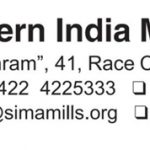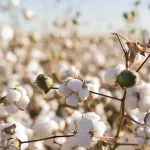Coimbatore
4th October 2023
The Southern India Mills’ Association (SIMA) delegation appeals to Hon’ble Union Finance Minister for financial relief measures and exemption of import duty on ELS cotton.
The predominantly cotton based Indian textiles and clothing industry has been facing an unprecedented financial stress and crisis for more than a year owing to steep fall in global and domestic demands caused by prolonged Ukraine-Russia war, economic slow down in EU, USA and other countries, 11% import duty on cotton and ill effects of MMF Quality Control Orders that had enabled the indigenous cotton traders and MMF producers to adopt import parity pricing and making the industry uncompetitive in the global market. The average monthly textiles and clothing exports during the period April 2022 to August 2023 has dropped by 19% when compared to the previous financial year 2021-22. The cotton textile exports dropped by 24% and cotton yarn exports dropped by 46%. The entire textile value chain particularly the capital-intensive spinning sector had to cut down its production by 30% to 40% continuously for several months that have forced majority of spinning mills particularly SMEs to become SMA1, SMA2 and NPA accounts. Under the current crisis, apart from regular loan repayment schedule, the ECGLS 1.0 has already increased the impact on the financials and the ECGLS 2.0 repayment to be made from October onwards, would drive majority of the spinning mills to become NPAs.

Dr. S.K. Sundararaman
In a Press Release issued here today, Dr. S.K. Sundararaman, Chairman, The Southern India Mills’ Association (SIMA) has stated that SIMA delegation met the Hon’ble Minister of Finance, Smt.Nirmala Sitharaman at Coimbatore on the evening of 3rd October 2023 and submitted a memorandum seeking conversion of ECGLS short term loans offered as a COVID relief measure with a repayment period of three years to six years term loan so as to reduce the financial burden for the textile units and avoid becoming NPAs both in the interest of the textile industry and also the financial institutions.
Dr. Sundararaman has said that the financial viability of the spinning mills in South India, particularly in Tamilnadu, which accounts 45% of the production capacity, is at stake under the current scenario. He has said that the spinning mills in Tamilnadu had to spend Rs.4/- to Rs.7/- per kg to procure the raw materials from the States like Gujarat and Maharashtra, sell over 40% of the yarn in Maharashtra and other States by spending equal amount. He has added that the powerloom and weaving sectors in Tamilnadu are sending over two crore metres of fabric per day for processing to the States like Gujarat and Maharashtra, as Tamilnadu does not have adequate processing facilities thus increasing the cost of fabric by Rs.2/- to Rs.3/- per metre. SIMA Chairman has pointed out that the steep increase in power tariff for the SME spinning mills upto Rs.2.35 per unit and for HT and EHT consumers by Re.1.00 per unit has increased the cost of production significantly as power accounts over 40% of the total manufacturing cost, He has said that the Hon’ble Finance Minister gave a patient hearing and indicated taking steps to address the financial stress being faced by textile units in the country.
SIMA Chief has stated that 11% import duty levied on cotton has made Indian cotton expensive by 10% to 15% as the domestic cotton traders adopt import parity pricing. He has said that the exporters have to forego RoDTEP export benefit while importing cotton under Advance Authorization Scheme, which has also curtailed the global competitiveness of the cotton textile exports. He has said that India has become a cotton deficit country from the status of cotton surplus country and the country would need around 400 lakh bales of cotton (170 kgs) for the current spinning and downstream sectors capacity when the market revives and would require more cotton in the coming years to achieve the envisaged textile business size of US $ 350 billion including US $ 100 billion exports by 2030.
Dr. Sundararaman has appealed to the Government to exempt the cotton from 11% import duty during April to October (off-season) as was done during the cotton seasons 2021-22 that would enable win-win strategy for both the cotton farmers and the industry, thereby avoiding speculation of cotton prices by the trade. Dr. Sundararaman has said that the country produces only around five lakh bales of Extra Long Staple cotton as against the requirement of 20 lakh bales. He has said that Indian exporters have established their market in the manufacture of superfine cotton textiles made out of Extra Long Staple Fibre particularly the PIMA cotton produced in USA and GIZA cotton produced in Egypt. He has said that the value addition in these cottons is around ten times and for several products, Indian ELS cotton like DCH 32 is blended with these cotton varieties, consequently increasing the value addition scope for Indian cotton.
SIMA Chairman thanked the Hon’ble Union Finance Minister for considering the plea made by the industry and introducing a separate HSN code in the recent Union Budget in order to specifically identify the imported ELS cotton, enabling implementation of specific policy measures or levying different rates of import duty including exemption for the said cotton fibre, as against the 11% import duty prevailing on a generic basis for all types of imported cotton, considering the demand and supply scenario. SIMA delegation has appealed to the Hon’ble Finance Minister to exempt the American PIMA and Egyptian GIZA ELS cotton from the import duty as India does not produce similar quality cotton and therefore will not affect the farmers. He has added that as India consumes around 45% of the PIMA and GIZA cotton produced per year the import duty removal is essential to sustain the market share already established by the country.





